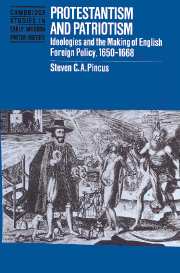Book contents
- Frontmatter
- Contents
- Acknowledgments
- List of abbreviations
- 1 Introduction
- Part I The rod of the Lord: ideology and the outbreak of the First Anglo-Dutch War
- Part II To unite against the common enemy: the 1654 Treaty of Westminster and the end of apocalyptic foreign policy
- Part III Popery, trade, and universal monarchy: ideology and the outbreak of the Second Anglo-Dutch War
- Part IV The Medway, Breda, and the Triple Alliance: the collapse of Anglican Royalist Foreign Policy
- 17 Historiographical overview
- 18 The circulation of news and the course of the war
- 19 The popular understanding of the war
- 20 The government's war aims
- 21 An Orangist revolution
- 22 Victory denied and wartime consensus shattered
- 23 The rise of political opposition
- 24 The road to Chatham: the decision not to send out a battle fleet
- 25 The demise of Anglican Royalist foreign policy
- Conclusion
- Bibliography
- Index
- Titles in the series
18 - The circulation of news and the course of the war
Published online by Cambridge University Press: 01 October 2009
- Frontmatter
- Contents
- Acknowledgments
- List of abbreviations
- 1 Introduction
- Part I The rod of the Lord: ideology and the outbreak of the First Anglo-Dutch War
- Part II To unite against the common enemy: the 1654 Treaty of Westminster and the end of apocalyptic foreign policy
- Part III Popery, trade, and universal monarchy: ideology and the outbreak of the Second Anglo-Dutch War
- Part IV The Medway, Breda, and the Triple Alliance: the collapse of Anglican Royalist Foreign Policy
- 17 Historiographical overview
- 18 The circulation of news and the course of the war
- 19 The popular understanding of the war
- 20 The government's war aims
- 21 An Orangist revolution
- 22 Victory denied and wartime consensus shattered
- 23 The rise of political opposition
- 24 The road to Chatham: the decision not to send out a battle fleet
- 25 The demise of Anglican Royalist foreign policy
- Conclusion
- Bibliography
- Index
- Titles in the series
Summary
Far from being a period in which public issues were deemed uninteresting or unimportant, the Restoration was an age mad for news and political information. “You cannot imagine to what a disease the itch of news is grown,” John Cooper informed the appreciative government newsletter-writer Joseph Williamson. Sir George Fletcher confessed that he was “infected” with “the love of news,” while George Davenport begged his friend William Sancroft, the Dean of St. Paul's, to send “a lick of news” to Durham. “You could not come into a tavern, alehouse, tippling or coffee-house, or sit at dinner” without being entertained with political gossip, “men, women and children of every rank to the very lowest, raving out their ill-digested humor which they call'd opinion, sparing neither law nor gospel, as if they would have as many governors as people.”
News – especially news about the war with the Dutch – was widely desired and ubiquitously available throughout the three kingdoms, and amongst a wide variety of social strata. In both London and Dublin, the Earl of Arlington thought, “the licentious discourses of the people” had “grown too big to be mastered.” Samuel Pepys gossiped about the merits of the Dutch War with his friends at the Royal Society and with his cheesemonger. “We are all very much concerned in this war,” Robert Mein reported from Edinburgh, “so that thousands of people attend the post office for good news.”
- Type
- Chapter
- Information
- Protestantism and PatriotismIdeologies and the Making of English Foreign Policy, 1650–1668, pp. 276 - 288Publisher: Cambridge University PressPrint publication year: 1996



